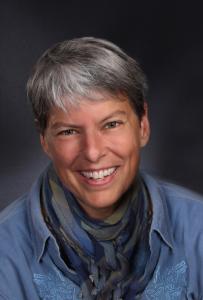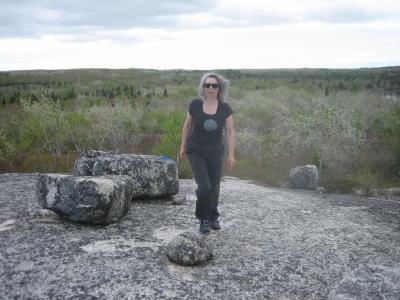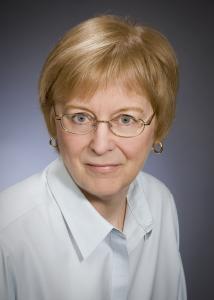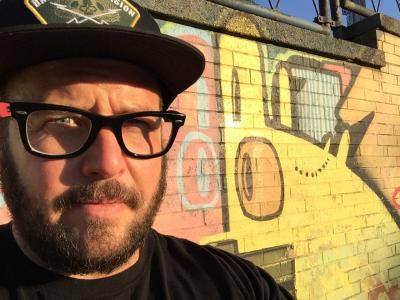Author spotlight: Dian Day
Dian Day is the author of two novels, The Clock of Heaven (Inanna, 2008), which won a silver medal in the Literary Fiction category of the Independent Publisher Book Awards, and The Madrigal (Inanna, 2018). She lives with her partner in rural Pictou County, where she is currently writing her doctoral dissertation and working on a third novel. In the following post, she shares with us her advice for aspiring writers, some details of her writing habits and current projects, and what she loves about living in her part of Nova Scotia.
How long have you been writing? What drew you to writing in general, and fiction in particular?
I have been writing as long as I can remember. I still have a little book in a box somewhere that I wrote and illustrated in Grade 2, called “My Friend Robin.” I think it has seven pages. I grew up in a house where books were sacred and had unsupervised access to a wide variety of both fiction and non-fiction. I was never told I was too young to read anything, so I read lots of books—novels, plays and poetry—when (I think now) I was really too young to be reading them! It’s safe to say I learned a lot about ‘real life’ through fiction.
Writing fiction allows me to explore the world through others’ eyes and to wrestle with and work through complex human problems: Why are we here? How should we behave? What changes us, despite our deep resistance? To write fiction feels like touching, very tenderly, a vital and essential humanity.
What do you think is changing in fiction these days? Are there any particular trends that you’ve noticed?
I kind of can’t keep up with what and how much is changing about reading and writing and publishing fiction, and I’ve never been able to pay much attention to trends in anything. However, I believe that most (good) fiction asks the same few fundamental questions while exploring ‘being human’ in fresh and compelling ways. It’s the freshness that allows us to read with excitement and, through reading, understand or experience things differently.
What’s the biggest misconception about being a writer?
There are a lot of misconceptions, I think. Here are my top three: 1. That it’s a straightforward process: do X and Y and Z and a book will pop out. I think this is why it’s such a common thing to question writers about their individual, idiosyncratic writing practice: we think, if I do X and Y and Z in the same way, I’ll finally be able to write that book I’ve been thinking about for all these years. 2. That much of the work of writing takes place in front of the blank page or computer screen. All books take huge amounts of research, reading, thinking, nightmares, vegetative time, long walks, and heads banging on walls in despair. It’s only maybe 10% actual writing time, but it’s all work. 3. That it isn’t hard work.
What advice do you have for aspiring writers?
Just write: a little bit or a lot every single day (or almost). It adds up to something eventually, and it gets better as you go along. Don’t think about getting it published or any other post-completion details while you’re still writing. That’s not why you’re doing it. You’re doing it because you can’t help it. If you can do something else, do that instead. Really. Just like planting a vegetable garden, it generally doesn’t pay you for all the hours you put into it. But you can’t help yourself, because the satisfaction of watching things grow is irresistible.
Do you workshop your material with other writers? Do you have a writing group?
I have worked with a writing group in the past and found it immensely helpful with my first novel. I’m a pretty solitary, introverted person, and I feel sure enough of myself now that I prefer to write a whole first draft, at least, without showing it to anyone. I find at the early stages of work I’m rather intensely trying to get my vision for the story solidified; that’s something I prefer to do on my own. There is a point when I’ll send the manuscript along to a handful of trusted readers for feedback. And I do have a few people who will read over and over and work through the hard bits with me; I couldn’t do without them.
What’s great about writing in your part of Nova Scotia?
I want to say that there are fewer interruptions in the country but I’m not sure that’s actually true. I can easily be interrupted by the overflowing vegetable garden, the sweep of beach, the bored dog, the sound of crickets, the deer walking across the hayfield… but they are interruptions that help me write better when I get back to my desk, I think. If I lived in the city I would be constantly interrupted by the size and number of public and university libraries and I might forget to write entirely.
Do you remember the first time you were paid for your writing? What was it like?
Halfway through my first attempt at getting a BA I was hired as a writer and editor of a tourist magazine on Vancouver Island—yes, I left school—and I thought I had truly ‘made it.’ And I suppose I had, though our dreams are not static. I lasted about a year before growing tired of the perpetual hyperbole that was (and largely still is) a requirement of tourism promotion. It’s too bad, because I think our best pleasures are largely quiet, unexpected ones.
Where do you like to write? Do you have a dedicated writing space, or do you prefer to move around?
I do move around the house with my laptop. Sometimes I sit at my desk in the upstairs study or curled in the wingback chair in the living room. In the winter I’m more likely to sit at the dining room table, because the woodstove is in our dining room. Last year we had this shack-like structure on the back of our (very old) house removed and replaced with a cozy south-facing sunroom; it is the only place I don’t allow myself to bring any electronic devices! It’s a technology-free zone. I do sit out there to drink tea or to read, or to stare admiringly at the orchard and garden, always beautiful, no matter what the weather or season.
What are you working on right now?
I’m working on a cultural studies doctoral dissertation that I hope will become a non-fiction book—my first. It’s a little more daunting than I imagined; there’s a need to ‘get things right’ in a completely different way from fiction. There are many external parameters one has to attend to. Although I am finding this to be the case with my next novel as well—which I’ll return to as soon as the thesis is done—as it is partly historical fiction. I have to do a lot of research, sift through contested historical ‘facts,’ decide which ‘truth’ I am going to accept, and fill in many missing, completely unfamiliar details in order to create a whole, believable world. That’s more daunting than I imagined, too – or it would have been if I had taken even five minutes to think about what I was doing before I started! Sometimes the stories we need to tell sneak up on us.
Author spotlight: Dian Day Read More »










